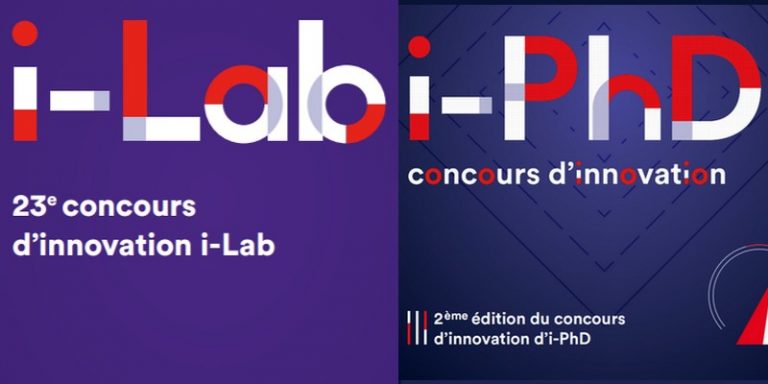
The award ceremony for the winners of the 2020-2021 Innovation Contest took place on Thursday, July 8, 2021. 120 winners were awarded in the two i-PhD and i-Lab components in the presence of Barbara Pompili, Minister of Ecological Transition, Frédérique Vidal, Minister of Higher Education, Research and Innovation, Agnès Pannier-Runacher, Minister Delegate in charge of Industry, Cédric O, Secretary of State in charge of Digital Transition and Electronic Communications, and Guillaume Boudy, Secretary General for Investment. A look back at the 2020-2021 edition of the competition.
The second edition of the i-PhD innovation competition
For the second consecutive year, with the support of Bpifrance, the French government has launched the i-PhD innovation competition with the aim of encouraging doctoral students nationwide to test the applicative potential of their projects, but also to support and accompany the first steps of ambitious projects (mentoring, training and financing schemes, networking) and to create a community of excellence of entrepreneurial researchers.
The competition is reserved for young researchers who are in the second or third year of their thesis and who have an innovative technological project attached to a transfer laboratory, financially supported by a technology transfer structure within the framework of maturation or prematurity.
Among the 43 winners of this 2020-2021 edition (including 10 grand prizes), 5 projects integrate or exploit AI. Here is the list:
Reef Pulse by Simon Elise (Grand Prize): the REEF PULSE project aims to develop a new method for monitoring coral reefs using ecoacoustics. This innovative approach proposes to analyse the ecological state and functioning of a coral reef by recording its “soundscape” using passive acoustics and automatically processing the collected data using AI algorithms.
ASTRIIS by Amgad Mohamed: the “AStrion” software proposed by ASTRIIS monitors the health of rotating components such as motors, turbines, pumps, gears or bearings. It detects and locates existing faults without the need for historical data, thus avoiding unplanned downtime. Asset management will be more efficient and maintenance more profitable. A module developed from artificial intelligence tools monitors the evolution of indicators and raises alarms for any abnormal evolution.
ENDIA by Orlando Chuquimia: EnDIA is an innovative software to help diagnose colonoscopy. This software integrates artificial intelligence to help the gastroenterologist in the detection and characterization of a polyp according to its histology, which will allow him to define the most appropriate treatment, resulting in a more effective and accurate diagnosis more quickly, while improving the quality of colonoscopies.
IMASMART by Adrien Julian: the IMASMART project aims to develop an innovative technology for earlier diagnosis of Alzheimer’s disease. The ambition is to create a medical device based on the analysis of the evolution of mobile phone use via artificial intelligence. This analysis will make it possible to identify breaks in the evolution of the disease in patients at risk.
Ladybird by Ludovic Gardy: the method used by Ladybird is based on an AI that has learned to recognize pathological signals related to epilepsy. This AI is assisted by a second signal processing algorithm, which verifies and sorts the results, imitating the work of the neurologist. All this is incorporated, among other functionalities, within a graphical interface optimized to adapt to hospital conditions and to be used by medical teams in the field.
The 23rd edition of the i-Lab innovation competition
Initiated in 1999 by the Ministry of Research within the framework of the law on innovation and research, the national competition for the creation of innovative technology companies has since been renewed each year with a dual objective: to detect and encourage the emergence of company creation projects based on innovative technologies and to promote the transfer of research results to the socio-economic world.
As for the i-PhD competition, ten projects were awarded a grand prize among the 61 winners, one of which includes artificial intelligence. This is the STELLA SURGICAL project, led by Clément Labiche, who has developed eSTELLA, a smartphone technology equipped with artificial intelligence, which enables the quality of a human liver to be assessed accurately and in real time with a view to a liver transplant. The breakthrough innovation is based on taking a photo of a liver, linked to image processing and prediction algorithms.
Other winners include projects related to:
- Pharmacy and biotechnology such as CILIA, led by Jean-Philippe Annereau, which exploits AI to select new drug structures and discover new innovative treatments for severe pediatric ciliopathies.
- Communication, digital and software technologies such as AiHerd ReID Morpho, led by Quentin Garnier, which uses computer vision and AI algorithms to help producers monitor the health of their cattle in real time. Or NavAlgo, a SaaS led by Zuzanna Kosowska-Stamirowska, which aims to optimize decisions in transport and supply chain.
- Medical technology with the start-up Kurage and Rudi Gombauld’s Re walk project, which has developed an artificial intelligence system to reproduce the motor functions of the central nervous system via neuroprostheses designed to sequence the selectivity and stimulation of the muscles of neurotics patients, enabling them to recover motor functions such as walking
- Mechanics, materials and industrial processes such as the EopromFlexLAB project, led by Christian Weisse and linked to the start-up MCEVE, where intelligent sensors are made from copper to feed AI data and enable the digital transition of industries.
Translated from Annonce des 120 lauréats des concours d’innovation 2020-2021 i-PhD et i-Lab









